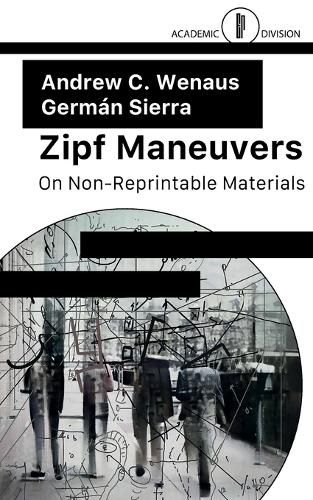Readings Newsletter
Become a Readings Member to make your shopping experience even easier.
Sign in or sign up for free!
You’re not far away from qualifying for FREE standard shipping within Australia
You’ve qualified for FREE standard shipping within Australia
The cart is loading…






Zipf Maneuvers: On Non-Reprintable Materials is a work of conceptual protest that challenges the commodification of knowledge in academic publishing, using mathematical and algorithmic techniques to resist institutional control over intellectual labour. In response to the exorbitant fee imposed by corporate publishers to reprint their own work, neuroscientist German Sierra and literary theorist Andrew C. Wenaus devise a radical strategy to bypass the neoliberal logic of access and ownership. As cultural critic and philosopher Steven Shaviro remarks in the introduction to this volume, the project orbits around Zipf's Law, a statistical principle that ranks words by frequency. Sierra and Wenaus deploy a Python algorithm to reorganize their original articles according to Zipfian distributions, alphabetizing and numerically indexing every word. This reorganization produces a fragmented, non-linear data set that resists conventional reading. Each word is assigned a number corresponding to its original position in the text, creating a disjointed, catalogue-like structure. The result is a protest against the corporate financialization of knowledge and a critique of intellectual property laws that restrict access. By transforming their essays into algorithmically rearranged data, Zipf Maneuvers enacts a singular form of resistance, exposing the absurdity of a system that hinders the free circulation of ideas.
$9.00 standard shipping within Australia
FREE standard shipping within Australia for orders over $100.00
Express & International shipping calculated at checkout
Zipf Maneuvers: On Non-Reprintable Materials is a work of conceptual protest that challenges the commodification of knowledge in academic publishing, using mathematical and algorithmic techniques to resist institutional control over intellectual labour. In response to the exorbitant fee imposed by corporate publishers to reprint their own work, neuroscientist German Sierra and literary theorist Andrew C. Wenaus devise a radical strategy to bypass the neoliberal logic of access and ownership. As cultural critic and philosopher Steven Shaviro remarks in the introduction to this volume, the project orbits around Zipf's Law, a statistical principle that ranks words by frequency. Sierra and Wenaus deploy a Python algorithm to reorganize their original articles according to Zipfian distributions, alphabetizing and numerically indexing every word. This reorganization produces a fragmented, non-linear data set that resists conventional reading. Each word is assigned a number corresponding to its original position in the text, creating a disjointed, catalogue-like structure. The result is a protest against the corporate financialization of knowledge and a critique of intellectual property laws that restrict access. By transforming their essays into algorithmically rearranged data, Zipf Maneuvers enacts a singular form of resistance, exposing the absurdity of a system that hinders the free circulation of ideas.